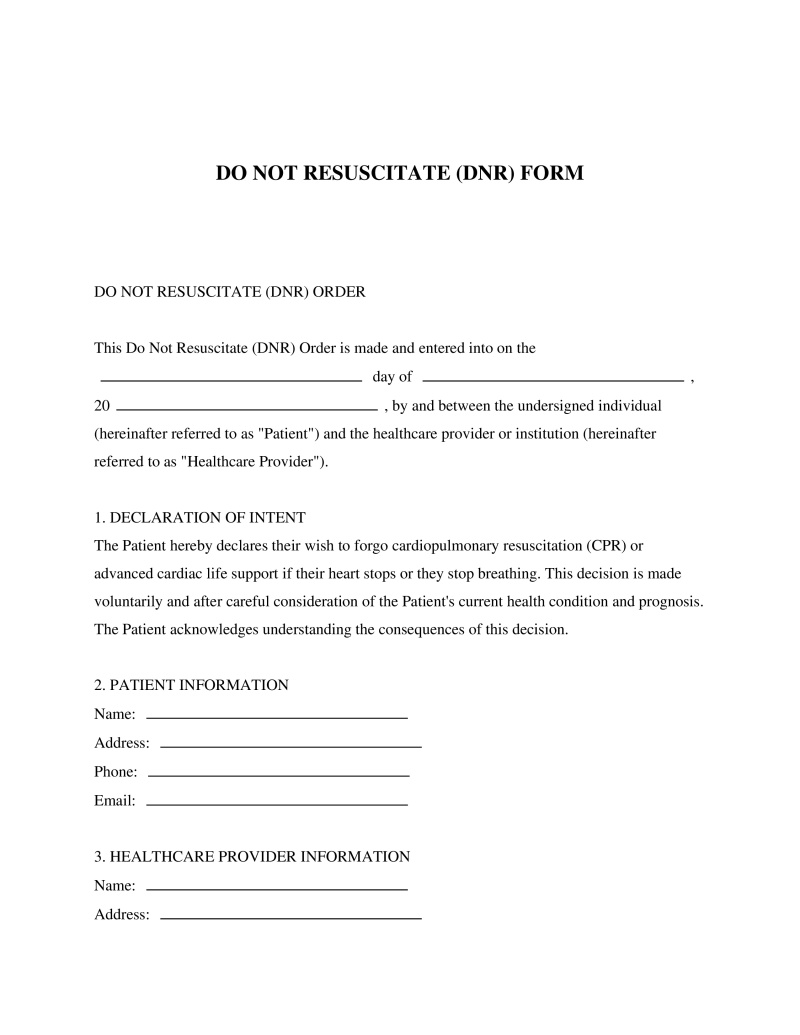A Do Not Resuscitate Form (DNR) is a legal document that instructs healthcare providers not to perform CPR.
Patient Full Name
Write the patient’s complete legal name as it appears on their government-issued ID, including first name, middle name (if any), and last name. Avoid using nicknames or abbreviations to ensure accuracy in legal documents. This name will be used for all official purposes, so it's important that it matches their legal identification.

Table of Contents
What is a Do Not Resuscitate Form (DNR)?
A Do Not Resuscitate Form (DNR) is a legally binding document that instructs healthcare providers not to perform cardiopulmonary resuscitation (CPR) in the event that a patient's breathing or heartbeat stops. This document is crucial for individuals who wish to decline potentially life-extending procedures due to terminal illness, advanced age, or the desire for a natural end of life without aggressive medical interventions. It ensures that a person's medical treatment preferences are respected and followed by medical personnel, thereby providing peace of mind to both the individual and their family members. The decision to implement a DNR requires careful consideration and, typically, consultation with a healthcare provider to understand its implications fully.
Key Features
Important Provisions
- A declaration statement clearly articulating the refusal of CPR and other resuscitative measures.
- Identification information of the individual making the declaration, ensuring there is no ambiguity about whose wishes are represented.
- Signatures from the individual (or legal representative) and a witness or healthcare provider as required by state laws.
- Instructions for revocation should the individual decide to change their preferences at a later date.
Pros and Cons
Pros
- +Ensures an individual's end-of-life wishes are respected, potentially avoiding unwanted medical interventions.
- +Reduces the emotional burden on family members during critical moments by having clear, documented instructions.
- +Helps avoid conflicts or confusion among healthcare providers about the desired approach to end-of-life care.
- +Provides legal clarity and certainty regarding the patient's preferences, reducing liability for medical personnel.
- +Can be part of comprehensive advance care planning that respects patient autonomy.
Cons
- -Requires thoughtful consideration and discussion with healthcare providers to ensure it aligns with the individual's wishes.
- -May not be immediately accessible in all emergency situations unless properly registered or communicated.
- -Could lead to family disagreements if not all members understand or agree with the decision.
Common Uses
- For individuals with terminal illnesses who wish to avoid aggressive life-saving measures.
- By elderly patients who prefer natural death over prolonged life support in case of severe health events.
- In situations where quality of life considerations outweigh the potential benefits of resuscitative efforts.
- As part of advance care planning by individuals who have strong convictions about their end-of-life care preferences.
- For patients with chronic conditions who wish to limit interventions that may prolong suffering without improving quality of life.
- By individuals as part of their living will or advance directive documentation.
Frequently Asked Questions
Do you have a question about a Do Not Resuscitate Form (DNR)?
Example questions:
Not the form you're looking for?
Try our legal document generator to create a custom document
Community Discussion
Share your experience and help others
Legal Notice: Comments are personal opinions and do not constitute legal advice. Always consult a qualified attorney for matters specific to your situation.
Comments (0)
Leave a Comment
No comments yet. Be the first to comment!